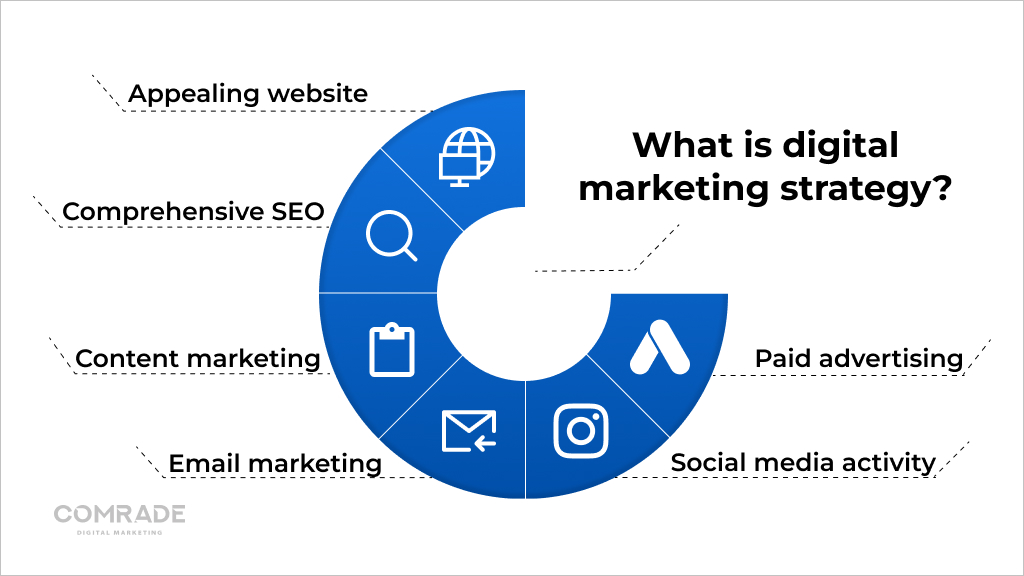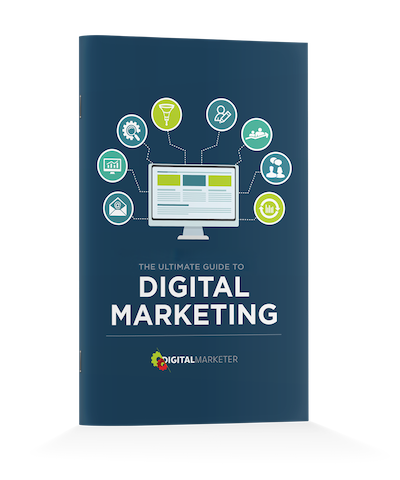Table of Contents
Introduction
Digital marketing has revolutionized the way businesses promote and sell their products and services. In this guide, I will provide you with valuable insights into the world of digital marketing strategies that work. From understanding the concept of digital marketing to exploring its importance and benefits, this guide will equip you with the knowledge you need to develop and implement effective digital marketing campaigns.
What is digital marketing?
At its core, digital marketing refers to the use of digital channels like websites, social media, and search engines to reach and engage with potential customers. Unlike traditional marketing methods, digital marketing allows businesses to target specific audiences, track results in real time, and optimize their strategies for maximum effectiveness.
Importance of digital marketing
Digital marketing plays a crucial role in today’s competitive business landscape. With the majority of consumers now relying on the Internet for their purchasing decisions, businesses that neglect digital marketing risk getting left behind. By leveraging digital marketing strategies, businesses can increase brand awareness, drive traffic to their websites, generate leads, and ultimately boost sales.
Benefits of using digital marketing strategies
One of the key benefits of digital marketing is its cost-effectiveness. Compared to traditional marketing methods, digital marketing offers a more affordable way to reach and engage with a wider audience. Additionally, digital marketing allows for highly targeted marketing campaigns, enabling businesses to tailor their messages and offerings to specific demographics.
Another advantage of digital marketing is its measurability. With various analytical tools, businesses can track and analyze the performance of their campaigns in real time, allowing for quick optimization and improving ROI.
By utilizing digital marketing strategies, businesses can expand their reach, establish their online presence, and connect with their target audience in a more personalized and effective manner.
Now that we have explored the fundamentals of digital marketing let’s dive deeper into specific strategies that can help you achieve your marketing goals.
Breaking the Mold: New Approaches to Digital Marketing

Understanding Digital Marketing
In today’s digital age, the success of any business often depends on its ability to effectively reach and engage with its target audience online. This is where digital marketing strategies come into play. From social media advertising to search engine optimization, these tactics can help businesses connect with customers, build brand awareness, and drive sales. In this section, I will provide a comprehensive overview of digital marketing, including its definition, various types, and key components for success.
Definition of Digital Marketing
Digital marketing refers to the use of digital channels and technologies to promote products or services. Unlike traditional marketing, which relies on print ads or billboards, digital marketing leverages online platforms such as websites, social media, search engines, and email to reach potential customers. This approach allows businesses to target specific demographics, track campaign performance, and adapt their strategies in real time.
Types of Digital Marketing
There are multiple types of digital marketing that businesses can utilize depending on their goals and target audience. These include search engine optimization (SEO), content marketing, social media marketing, email marketing, pay-per-click (PPC) advertising, and influencer marketing. Each type serves a specific purpose and requires unique tactics to maximize its effectiveness.
Key Components of Successful Digital Marketing
To create successful digital marketing campaigns, businesses must focus on a few key components. Firstly, understanding the target audience is crucial in crafting relevant and engaging content. Secondly, a well-designed website that is user-friendly and optimized for search engines can significantly boost online visibility. Thirdly, utilizing data and analytics to track and measure campaign performance allows for continuous improvement. Finally, integrating various digital marketing tools and platforms can help streamline processes and enhance overall efficiency.
By understanding the definition, types, and key components of digital marketing, businesses can develop effective strategies to connect with their target audience, increase brand visibility, and achieve their marketing goals.
Setting Goals and Objectives
Setting clear goals and objectives is crucial for any successful digital marketing strategy. It provides direction, helps measure progress, and ultimately determines the overall success of your efforts. In this section, we will explore how to identify your business objectives, set SMART goals for your digital marketing campaigns, and understand the role of Key Performance Indicators (KPIs) in measuring success.
Identifying business objectives
Before diving into specific digital marketing strategies, it’s important to identify and prioritize your business objectives. These objectives should align with your overall business goals and provide a foundation for your digital marketing efforts. Whether it’s increasing brand awareness, generating leads, driving website traffic, or boosting sales, clearly identifying your objectives will help you create targeted and effective strategies.
SMART goals for digital marketing
Once you have established your business objectives, it’s time to set SMART goals for your digital marketing campaigns. SMART stands for Specific, Measurable, Achievable, Relevant, and Time-bound. By setting specific, measurable, and realistic goals, you can track your progress and ensure that your efforts are aligned with your overall objectives.
Role of KPIs in measuring success
Key Performance Indicators (KPIs) are essential metrics that allow you to objectively measure the success of your digital marketing strategies. Whether it’s conversion rates, website traffic, engagement metrics, or revenue, KPIs provide valuable insights into the effectiveness of your campaigns. By regularly evaluating and analyzing these indicators, you can identify areas for improvement and make data-driven decisions to optimize your digital marketing efforts.
In the following sections, we will delve deeper into various digital marketing strategies that can help you achieve your goals and objectives. Whether it’s search engine optimization, social media marketing, content creation, or email marketing, each strategy plays a unique role in building a comprehensive and effective digital marketing plan. So, let’s move forward and discover the strategies that work!

Target Audience and Market Research
Identifying target market segments
When it comes to digital marketing strategies, one of the most crucial steps is identifying your target market segments. Understanding who your audience is and what they care about allows you to tailor your marketing efforts effectively. Start by considering factors such as demographics, psychographics, and behavior patterns. This will help you create detailed buyer personas that represent your target audience.
Conducting market research
Market research is an essential aspect of digital marketing strategy. It involves collecting and analyzing data about your target market, competitors, and industry trends. By conducting market research, you can gain insights into your audience’s preferences, purchasing behavior, and pain points. This information can then be used to refine your marketing campaigns and build stronger customer relationships.
Understanding customer needs and preferences
To truly connect with your target audience, it is essential to understand their needs and preferences. By delving into customer feedback, conducting surveys, and analyzing data, you can uncover valuable insights about what motivates your audience and how you can better meet their expectations. This will enable you to create personalized marketing messages and offers that resonate with your customers on a deeper level.
By identifying target market segments, conducting market research, and understanding customer needs and preferences, you can lay a strong foundation for your digital marketing strategies. These strategies will help you effectively reach and engage with your target audience, driving greater results and success for your business.
Creating a Digital Marketing Strategy
Developing a comprehensive marketing plan is an essential first step in creating an effective digital marketing strategy. It involves understanding your target audience, conducting market research, and setting clear goals and objectives. This will help you determine the best strategies and tactics to reach and engage your target customers.
Developing a comprehensive marketing plan
To develop a comprehensive marketing plan, start by conducting thorough research on your target audience. Understand their demographics, preferences, and behavior to tailor your marketing messages accordingly. Set specific goals that align with your overall business objectives, whether it’s increasing brand awareness, driving website traffic, or generating leads.
Choosing the right digital marketing channels
Choosing the right digital marketing channels is crucial to effectively reach your target audience. Consider the platforms and channels where your target customers spend their time. This might include social media platforms like Facebook, Instagram, or LinkedIn or other channels like email marketing, content marketing, or search engine optimization (SEO). Focus on the channels that will provide the greatest return on investment for your business.
Allocating resources effectively
It’s important to allocate your resources effectively to maximize the impact of your digital marketing efforts. This includes setting a budget for each channel, determining how much time and manpower you can dedicate to each strategy, and regularly evaluating and adjusting your resources based on the performance of different tactics. Additionally, consider investing in digital marketing tools and automation software to streamline your processes and improve efficiency.
Creating a successful digital marketing strategy requires careful planning and execution. By developing a comprehensive marketing plan, choosing the right channels, and allocating resources effectively, you can drive meaningful results and grow your business in the digital landscape.

Implementing Effective Digital Marketing Tactics
In today’s fast-paced digital landscape, implementing effective digital marketing tactics has become crucial for businesses to stay competitive and reach their target audience. In this section, I will discuss three essential strategies that can significantly impact your online presence: Search Engine Optimization (SEO), Pay-Per-Click (PPC) advertising, and Content Marketing.
Search Engine Optimization (SEO)
SEO is a fundamental aspect of digital marketing that focuses on improving your website’s visibility in search engine results. By optimizing your website’s content, structure, and HTML elements, you can increase organic traffic and attract potential customers. Implementing SEO techniques such as keyword research, on-page optimization, link building, and user experience optimization can greatly boost your website’s ranking on search engines.
Pay-Per-Click (PPC) Advertising
PPC advertising allows businesses to target specific keywords and display their ads on search engine results pages. By setting a budget and bidding on keywords, you pay only when users click on your ads. This strategy can drive targeted traffic to your website and generate leads quickly. Effective PPC campaigns require careful keyword selection, compelling ad copy, landing page optimization, and continuous monitoring to maximize ROI.
Content Marketing Strategies
Creating and delivering valuable, relevant, and consistent content is essential for attracting and retaining customers. Content marketing involves producing blog posts, articles, videos, infographics, and other forms of content that educate, inform, and entertain your target audience. By establishing your brand as a thought leader and providing valuable insights, you can build trust and credibility with your audience, ultimately driving conversions and customer loyalty.
By implementing these effective digital marketing tactics, you can enhance your online visibility, attract quality traffic, and achieve your business goals in the digital realm. Stay tuned for the next section, where we dive deeper into social media marketing strategies and email marketing best practices.
Leveraging Social Media and Influencer Marketing
In today’s digital landscape, social media and influencer marketing have become paramount to the success of any digital marketing strategy. The power of social media marketing cannot be underestimated. Platforms like Facebook, Instagram, Twitter, and LinkedIn offer a vast audience base to connect with potential customers and engage with existing ones. With the ability to target specific demographics and interests, social media allows businesses to reach their ideal audience effectively.
Building a strong social media presence is crucial for any brand. By consistently sharing valuable content, interacting with followers, and responding to comments and messages, you can establish an authentic connection with your audience. Showcasing your expertise and thought leadership will position you as an industry expert, which can lead to increased brand visibility, credibility, and customer loyalty.
One highly effective approach to social media marketing is utilizing influencer partnerships. Collaborating with influencers who have a large following and share your target audience can significantly amplify your brand’s reach and credibility. By leveraging their influence and recommendation, you gain access to a highly engaged audience, increasing the chances of conversion and brand advocacy.
To achieve success in social media and influencer marketing, it is essential to create a comprehensive strategy that aligns with your overall business goals. This includes identifying the right influencers to partner with, developing compelling content that resonates with your audience, and measuring the effectiveness of your campaigns through key performance indicators (KPIs). With a well-executed social media and influencer marketing strategy, you can connect with your audience on a deeper level and drive meaningful results for your business.

Conclusion
In conclusion, this ultimate guide to digital marketing strategies that work has provided valuable insights into the world of digital marketing. We have discussed various digital marketing tools and explored effective strategies for success in the digital realm.
Summary of Digital Marketing Strategies
We delved into the different digital marketing strategies that have proven to be effective in driving traffic, generating leads, and increasing conversions. These strategies include search engine optimization (SEO), content marketing, social media marketing, email marketing, and paid advertising. By implementing these strategies, businesses can reach a wider audience, engage with customers, and achieve their marketing goals.
Future Trends in Digital Marketing
As technology continues to evolve, so does the world of digital marketing. Emerging trends that we can expect to see in the future include artificial intelligence (AI) and machine learning, voice search optimization, personalized marketing experiences, and the rise of video content. By staying updated with these trends and adopting innovative approaches, businesses can stay ahead of the competition and capture the attention of their target audience.
Overall, digital marketing is a dynamic and ever-changing field. By understanding the tools, strategies, and future trends discussed in this guide, you will be equipped with the knowledge needed to excel in the digital marketing landscape and drive your business towards success.
